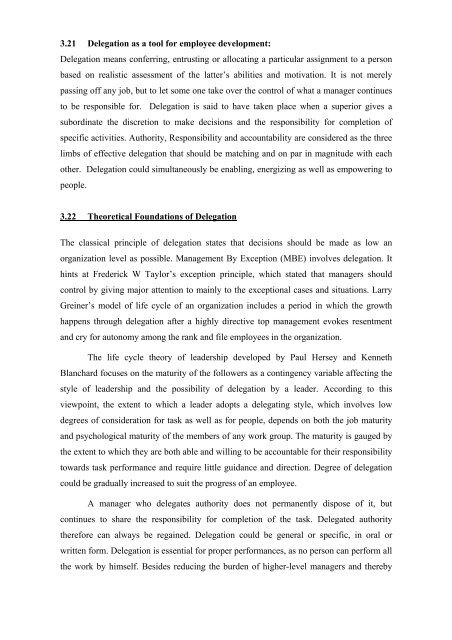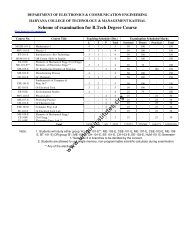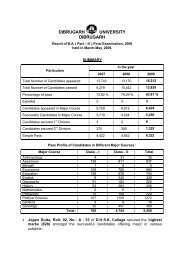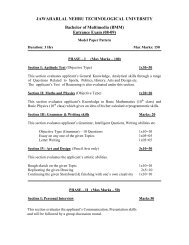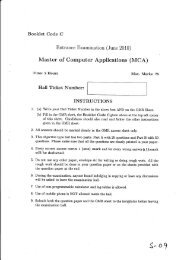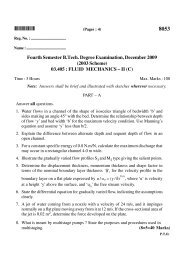UNIT – I Lesson 1 HRM – AN OVERVIEW Lesson Outline Nature of ...
UNIT – I Lesson 1 HRM – AN OVERVIEW Lesson Outline Nature of ...
UNIT – I Lesson 1 HRM – AN OVERVIEW Lesson Outline Nature of ...
Create successful ePaper yourself
Turn your PDF publications into a flip-book with our unique Google optimized e-Paper software.
3.21 Delegation as a tool for employee development:<br />
Delegation means conferring, entrusting or allocating a particular assignment to a person<br />
based on realistic assessment <strong>of</strong> the latter’s abilities and motivation. It is not merely<br />
passing <strong>of</strong>f any job, but to let some one take over the control <strong>of</strong> what a manager continues<br />
to be responsible for. Delegation is said to have taken place when a superior gives a<br />
subordinate the discretion to make decisions and the responsibility for completion <strong>of</strong><br />
specific activities. Authority, Responsibility and accountability are considered as the three<br />
limbs <strong>of</strong> effective delegation that should be matching and on par in magnitude with each<br />
other. Delegation could simultaneously be enabling, energizing as well as empowering to<br />
people.<br />
3.22 Theoretical Foundations <strong>of</strong> Delegation<br />
The classical principle <strong>of</strong> delegation states that decisions should be made as low an<br />
organization level as possible. Management By Exception (MBE) involves delegation. It<br />
hints at Frederick W Taylor’s exception principle, which stated that managers should<br />
control by giving major attention to mainly to the exceptional cases and situations. Larry<br />
Greiner’s model <strong>of</strong> life cycle <strong>of</strong> an organization includes a period in which the growth<br />
happens through delegation after a highly directive top management evokes resentment<br />
and cry for autonomy among the rank and file employees in the organization.<br />
The life cycle theory <strong>of</strong> leadership developed by Paul Hersey and Kenneth<br />
Blanchard focuses on the maturity <strong>of</strong> the followers as a contingency variable affecting the<br />
style <strong>of</strong> leadership and the possibility <strong>of</strong> delegation by a leader. According to this<br />
viewpoint, the extent to which a leader adopts a delegating style, which involves low<br />
degrees <strong>of</strong> consideration for task as well as for people, depends on both the job maturity<br />
and psychological maturity <strong>of</strong> the members <strong>of</strong> any work group. The maturity is gauged by<br />
the extent to which they are both able and willing to be accountable for their responsibility<br />
towards task performance and require little guidance and direction. Degree <strong>of</strong> delegation<br />
could be gradually increased to suit the progress <strong>of</strong> an employee.<br />
A manager who delegates authority does not permanently dispose <strong>of</strong> it, but<br />
continues to share the responsibility for completion <strong>of</strong> the task. Delegated authority<br />
therefore can always be regained. Delegation could be general or specific, in oral or<br />
written form. Delegation is essential for proper performances, as no person can perform all<br />
the work by himself. Besides reducing the burden <strong>of</strong> higher-level managers and thereby


